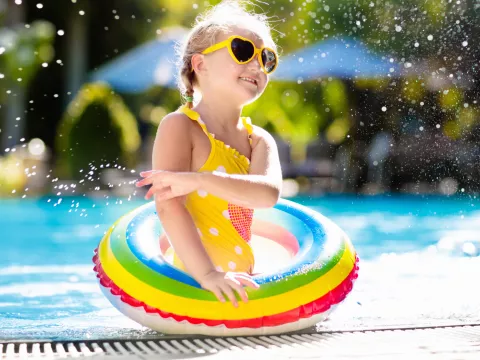- AdventHealth

Summer fun in the sun often means fun in the water, too. Whether you'll be hitting the pool, lake, or beach this season, there are some crucial safety tips your family should know.
Our emergency medicine experts have advice on keeping kids of all ages protected from water-related accidents.
Remember, even a small amount of water has the potential to become hazardous. For example, a child may be in relatively shallow water in the ocean, but if knocked to the ground by a wave and struck in the head, a drowning can occur in only inches of water.
It's especially important to keep water safety tips top of mind when your family is going on a vacation that will put children in a new, unfamiliar environment. If you have a pool and are hosting family, or will be visiting a relative who has a pool, you should take extra precautions (like alarms or barricades) to protect children from the water.
Here are our top water-safety tips to remember:
Don't Leave Children Unattended
You might be tempted to quickly step away or do a few chores while your little one is playing, but it's so important to never leave small children alone or in the care of another child in pools, spas, or even the bathtub.
According to the American Academy of Pediatrics, an adult should be only an arm's length away when infants, toddlers, and weak swimmers are in or around water. Swimmers of all ages should never swim alone; always use the buddy system, even at a public pool or lifeguarded beach.
At social gatherings when you're supervising children in the water, the following anecdote holds true: if its everyone's job, its no one's job.
For safety, at social gatherings, assign specific adult(s) to do nothing but supervise children in the water. Wearing a laminated card on a lanyard around the neck easily identifies who is responsible, and the card may be passed off to another adult when you need a break or a shift change. This way, someone is formally "in charge" and vigilant about safety.
Take Swim Lessons
The Red Cross or your local YMCA can help you find swim lessons for ages six months and up. It's smart to start your children early.
There is no substitute for swimming lessons, including infant swim, where babies learn to float on their backs and essentially save themselves if they fall into the water on accident.
Remember that regardless of how many lessons your kids have had, being in water can challenge their skills and become overwhelming at a moments notice. It's important to always stay nearby.
As young swimmers get more confident, they may be excited to jump in the pool. Teach kids to ask permission before entering any water so you are always ready to supervise when they do.
Swim Near the Lifeguard
Make sure you know the depth of the water before allowing a child to enter. Always jump in feet-first to test depth and gauge whether it's appropriate for your child's abilities. Even if you feel they are strong swimmers, children should always stay within sight of you and a lifeguard. Give them boundaries within the pool limits to keep them from swimming too far away or toward the deep end.
When at the beach, stay near the guard station. Older swimmers should know what to do in case of rip currents swim parallel to the shore until out of the current, then swim back to the shore. Young children should only enter the ocean with an adult to avoid being overtaken by unpredictable waves.
It's important to remember that while pool floats can be helpful and fun, they are not considered life-saving devices.
Never rely on water wings, flotation devices, or even lifejackets to save a child. These aids are considered to be just that aids not replacements for supervising adults.
But when boating, ensure everyone on the watercraft has an appropriately-sized lifejacket in case someone should fall overboard. State laws vary when it comes to children wearing lifejackets on boats, but regardless of where you live should always err on the side of caution.
Learn CPR
In the event of an emergency, call 911 immediately.
Performing CPR when someone is pulled from the water can save their life in the time it takes for EMS to arrive. Pre-hospital and bystander CPR are critical to saving lives.
If you're feeling overwhelmed by an upcoming trip to the pool or beach, remember that preparation and attentiveness are key to keeping the kids safe and healthy while they're having fun. Relax, don't multitask, and focus on making fun summer memories with the family.
Count on Us
If you have a water-related incident, it's important to get care quickly. When you call 911 ask to go to your nearest AdventHealth hospital where our experts will treat your child right away.




